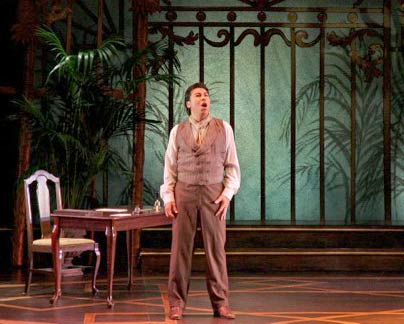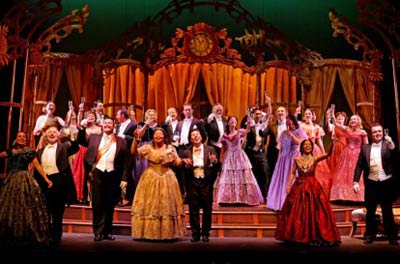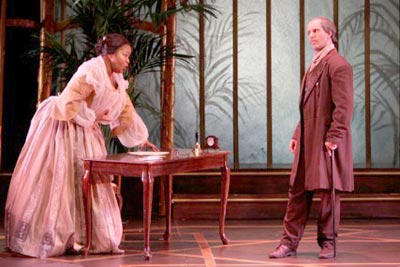Opera at Its best is a combination of music, acting, and a story. Although music is generally considered the most important of these three, I look upon them all as essential. And in the act of creation of an opera, the story usually comes first. In 1852, Verdi saw the new play, Lady of the Camellias by Alexandre Dumas fils, walked out of the theatre saying that must be my next opera, and presented the first version of La Traviata only a year later.
Dumas first cast the story as a novel in 1848 when he was 24 years old. He explained, “Not being old enough to invent, I content myself with narrating, and I beg the reader to assure himself of the truth of a story in which all the characters, with the exception of the heroine, are still alive.” Indeed, the novel is definitely autobiographical with the hero (Armand in the novel; Alfredo in the opera) being Dumas, and the heroine (Marguerite, Violetta) being his mistress, Marie Duplessis. (My cursory research does not indicate whether Dumas p�re was an accurate model for the hero’s father; since The Three Musketeers, and The Count of Monte Cristo are among my favorite childhood books, I hope not).
I’ve probably seen close to a dozen performances of La Traviata, starting with one by the old Center Opera in Minneapolis almost 40 years ago. It has always been on the list of “My X favorite operas” – but until last night it was always at the bottom of that list. The ingredients are all there. The music is superb, the plot is no worse than usual, and I rarely had specific complaints with the acting. But somehow the whole was less than the sum of its parts. I just couldn’t get emotionally involved.

I approached last night’s performance by West Bay Opera with cautious optimism that this would be different. A week ago I attended both a “Preview” of the opera, put on by the Guild and featuring a couple of selections (with piano accompaniment) by the principals, and a “Working rehearsal” in WBO’s rehearsal space without scenery or costumes. Karen Slack is an unlikely looking Violetta – there is so much of her that it’s hard to believe she could be dying of consumption – that is until she begins to sing and act when she becomes utterly convincing. Jes�s Le�n is a living incarnation of Alfredo. He exudes a boyish charm and a happy-go-lucky approach to life.
Cautious optimism remained my mood through the overture. There are many operas, such as Verdi’s Rigoletto, where the first notes of the overture say, “Sit up and take notice!” The first phrases in the overture to La Traviata say, “Sit back and relax; I have a tale to tell.” Soon I am caught up in a potpourri of familiar melodies to come. The curtain rises slowly, revealing in order feet, legs, waists, torsos, and faces of Violetta, Flora, and the chorus of party-goers in a beautifully costumed, utterly motionless, and absolutely silent tableau. Conductor John Kendall Bailey and Director Richard Harrell gave us just the right amount of time to enjoy this spectacle before every member of the chorus burst into animated motion and chatter and the opera was underway. A very effective beginning.
I’m still cautious through the first few minutes. Then Alfredo appears and leads his famous toast and I know this is going to be a great performance. And it is.
Of all the various music forms in opera, my favorite is the duet. My unsophisticated musical ear can somehow process on three channels simultaneously: her voice, his voice, and their voices. La Traviata has many duets with Violetta and Alfredo; and the voices of Karen Slack and Jes�s Le�n fit together with almost incredible beauty.

I honestly tried to watch Act II Scene 1 with an open mind. I reminded myself that Germont was typical of his time and place, that he loved his family, that he thought he was doing the right thing. It didn’t work. I still found myself saying under my breath, “You are a – �louse’,” (but the word in my mind was stronger than �louse’). The part was beautifully underplayed by baritone Zachary Gordin. In contrast to the more flamboyant Violetta and Alfredo, his voice, his actions, his emotions all seemed small – in scale with his small mind. He comes to Violetta with that small mind tightly tied up in a neat package: Violetta is a whore. My son must have nothing to do with her, or my entire family is contaminated. I shall demand that she give him up entirely. He utterly fails to see the irony in treating her like dirt and at the same time telling her how noble she will be when she makes the great sacrifice he demands of her. But he doesn’t even listen to her. When she pleads that she only has a short time to live and that this is the first time she has ever known happiness, he responds by telling her she is still young and pretty and can easily find some other young man to love her.
Bah. Germont is a �louse’. Right down there with Puccini’s Pinkerton in Madama Butterfly.
I’ll admit that he does show a tinge of humanity by reaching out as if to put a hand on her shoulder; but the hand stops just short of actually touching this immoral creature. And when she throws herself at him crying, “embrace me as your daughter” he actually stands still and lets her hug him. Still, as he walks off stage after this embrace, Germont is a �louse’.
Of course, in this same scene Alfredo shows that he is no better than the average operatic tenor. Early in the scene he discovers that Violetta has been selling her assets to pay for the idyllic life they’ve been living and rushes off to town to get some money to “remove the shame on his honor” for having been supported by a woman.

Worse, when he finds out Violetta has left him he cries out, “Revenge” and rushes out to end the scene. And worse still in Scene 2 when he wins money from Violetta’s “protector” Baron d’Obigney and throws it in Violetta’s face.
For that matter, at this point I’m a bit out of sympathy with Violetta. I’d rather she’d shown a bit less nobility and a bit more wisdom. She could have remained calm and proposed a compromise along the lines of “I’ll send him away for 3 months to give you time to get your daughter married to her prig of a betrothed, and when we do get together for the few remaining months of my life we’ll be more discreet. Take it or leave it.”
But then, if sopranos and tenors were reasonable, what would happen to that wonderful tension that makes opera so glorious?
I think that in previous productions I was sort of tuned out by the end of Act II. I listened to the great music in the last act and observed the goings on, but I no longer felt involved. But somehow last night I stayed with the characters, warts and all. I attributed Alfredo’s gross behavior to his youth (he was barely out of his teens); I sympathized with Violetta’s sorrow regardless of its being partially her own fault. I even forgave Germont when he publicly admitted that he had been a fool. As the act ended I felt emotionally satisfied in the complex combination of sorrow in her death and joy in their brief moment of mutual reconciliation.

The entire audience must have felt the same way. Not only did they refrain from applauding as the curtain started down, there was a full second of silent tribute after the last note before the entire auditorium burst into thunderous applause.
If you are lucky enough to live within a hundred or so miles of Palo Alto, go immediately to West Bay’s website at wbopera.org, click on BUY TICKETS HERE, and order yourself a ticket for either of their final two performances on Saturday evening or Sunday afternoon, May 29 – 30. You’ll be glad you did.
The Opera Nut
WEST BAY OPERA
Lucie Stern Theatre
221 Lambert Avenue
Palo Alto, CA 94306
650.424.9999
Photos: Otak Jump
P. S. I mentioned above seeing the working rehearsal ten days before opening night. It was fascinating. Full chorus, director, all soloists, conductor and piano but no orchestra. Held in rehearsal space, not in theater. Floor area marked off as stage, but no wings, no scenery, minimal props. Casual street dress. Rehearsed only a couple of scenes. Sung all in Italian. No supertitles, of course.
I won’t try to describe the whole evening in detail, but here are a few highlights. It started with the toreador dance from II-2. This was danced with only 1 couple as soloists: a male part, danced by a woman who is not a singer, and a female part danced by a member of the chorus. Great fun to watch and listen to. Saw the whole dance 3 times and parts of it a couple more. When the director was finally satisfied, the specialty dancer went home. Later in the evening when they did the whole scene it was interesting to watch the chorus member dance her part with no partner. She did it well.
It was fascinating to see the director trying to coax the chorus into a better performance, both singing and acting. He thought they were too stiff and formal at one point, so he stopped the rehearsal and reminded them that this was a have-fun party, not a pageant. The women are all sexy and the men should think of themselves not as bankers or lawyers, but more as pirate kings. And he strode up to them singing the Gilbert & Sullivan aria “for I am a pirate king, (you are, hurrah for the pirate king), and it is it is a glorious thing to be a pirate king.” Very impressive.
Again, as guests left the party at the end of I, some of the men kissed Violetta’s hand. The director told them, “She’s not the Pope, you know – you’re saying good-bye to a good friend. You’ve probably slept with her. Try to convey affection – maybe a shared secret – not formal respect!” I watched that detail closely during the performance; it was much better than at the rehearsal.
This review by Philip G Hodge appeared in sanfranciscosplash.com on May 24, 2010.




